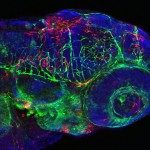Link to Pubmed [PMID] – 30016370
PLoS Pathog. 2018 Jul;14(7):e1007157
Understanding the roles of neutrophils and macrophages in fighting bacterial infections is a critical issue in human pathologies. Although phagocytic killing has been extensively studied, little is known about how bacteria are eliminated extracellularly in live vertebrates. We have recently developed an infection model in the zebrafish embryo in which leukocytes cannot reach the injected bacteria. When Escherichia coli bacteria are injected within the notochord, both neutrophils and macrophages are massively recruited during several days, but do not infiltrate the infected tissue presumably because of its tough collagen sheath. Nevertheless, the bacteria are killed during the first 24 hours, and we report here that neutrophils, but not macrophages are involved in the control of the infection. Using genetic and chemical approaches, we show that even in absence of phagocytosis, the bactericidal action relies on NADPH oxidase-dependent production of superoxide in neutrophils. We thus reveal a host effector mechanism mediated by neutrophils that eliminates bacteria that cannot be reached by phagocytes and that is independent of macrophages, NO synthase or myeloperoxidase.

